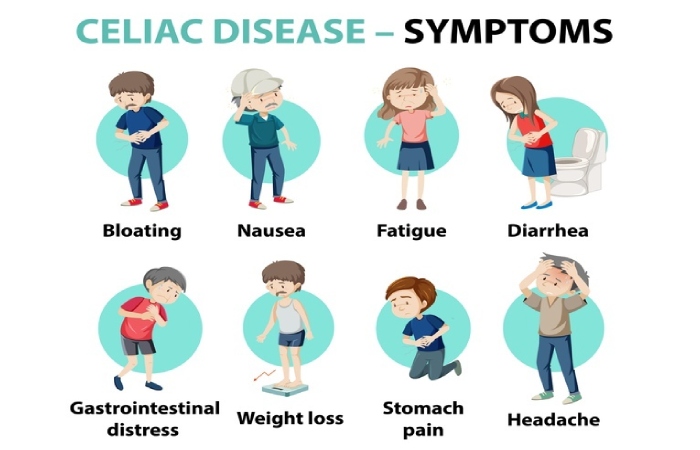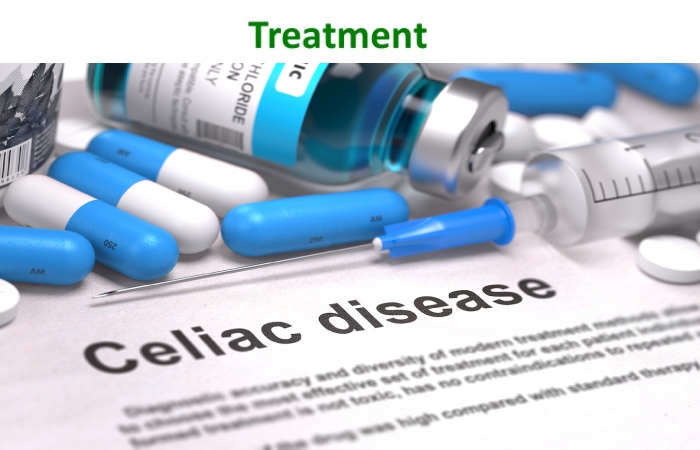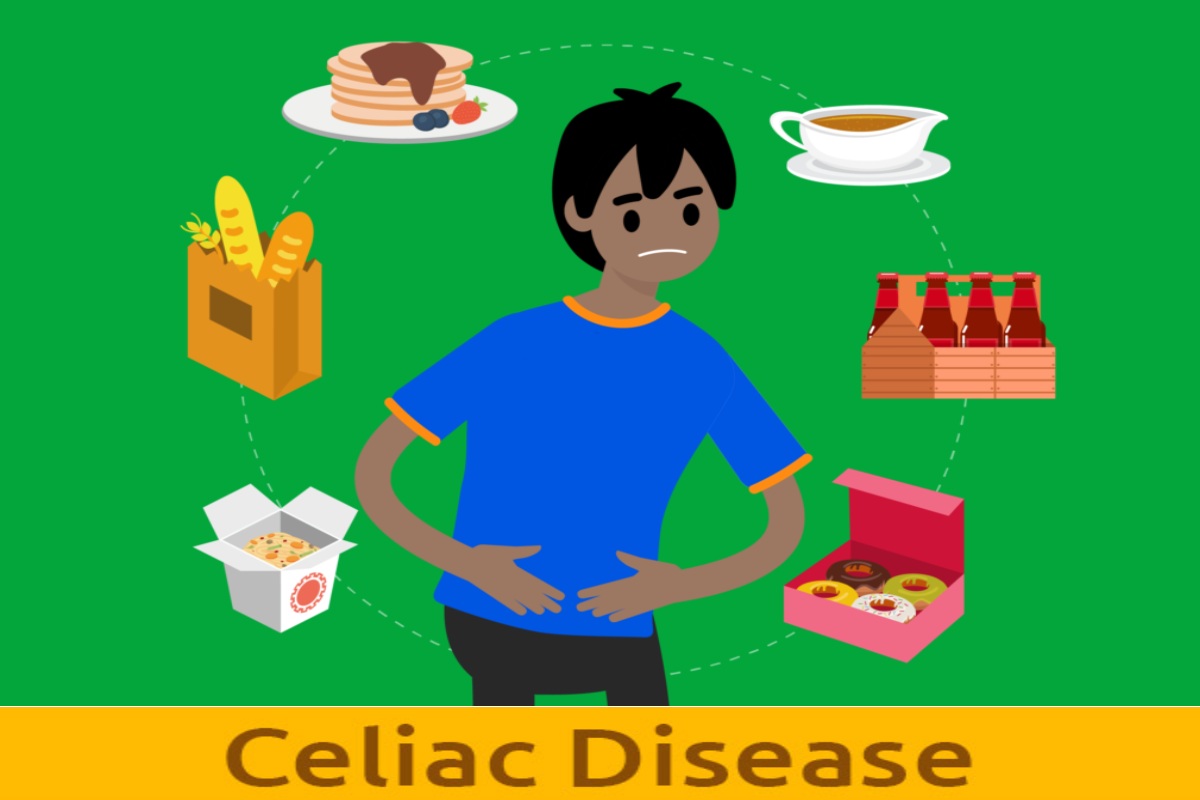Table of Contents
Celiac Disease Definition
Celiac disease, sometimes called celiac disease or gluten-sensitive enteropathy, is an immune system reaction to gluten consumption, a protein found in wheat, barley, and rye.
If you have celiac disease, eating gluten triggers an immune response in your small intestine. Over time, this reaction damages the small intestine lining and prevents it from absorbing nutrients (malabsorption). Intestinal damage often reasons diarrhoea, fatigue, weight loss, bloating, and anaemia and can principal to severe complications.
In children, malabsorption can affect development and development, in addition to causing the symptoms seen in adults. There is no conduct for it, but a strict gluten-free diet can help control symptoms and promote intestinal healing for most persons.
Also Read: WHAT IS TINOSPORA CORDIFOLIA? – WORK, HEALTH BENEFITS, SIDE EFFECTS, AND MORE
What are the Causes of Celiac Disease?
The exact cause of celiac disease is unknown. The lining of the intestines has small areas called villi that project outward at the opening of the intestine. These structures benefit absorb nutrients.
When people with it eat nutriments with gluten, their immune systems react by causing damage to the intestinal villi. Due to this damage, the villi are unable to absorb iron, vitamins, and nutrients properly. Consequently, some symptoms and health problems can occur.
The disease can manifest itself at any time in life, from infancy to late adulthood. People with relatives who have are at higher risk of developing the disease. This disorder is more common in people of European descent.
People with celiac disease more expect to have:
- Autoimmune illnesses such as rheumatoid arthritis, systemic lupus erythematosus, and Sjögren’s;
- Syndrome;
- Addison’s disease;
- Down’s Syndrome;
- Intestinal cancer;
- Intestinal lymphoma;
- Lactose intolerance;
- Thyroid disease;
- And also, Type I diabetes.
What are the Symptoms of Celiac Disease?

There is significant variability in symptoms, and there are not always proper digestive symptoms. And also, the symptoms that patients with celiac disease present depend on the poor absorption of the nutrients contained in the diet.
They may report any of the following symptoms (combined or isolated):
- Chronic diarrhoea.
- Weightloss.
- Great, greasy stools.
- And also, Unexplained anaemia;
- Recurring abdominal pain.
- Gases.
- Bone and joint pain.
- Muscle cramps.
- Tiredness.
- And also, Growth retardation.
Some people do not account for any symptoms because the undamaged part of their intestine can absorb enough nutrients to prevent symptoms.
What are the Complications of Celiac Disease?
Most of the complications of celiac disease are related to nutritional deficits secondary to impaired food absorption:
- Osteoporosis,
- Short stature or growth retardation,
- Congenital malformations in children of celiac mothers not treated during pregnancy,
- Dizziness,
- And also, Seizures, etc.
It has also link to some bowel cancers (lymphoma, adenocarcinoma).
How is Celiac Disease Diagnosed?
- It diagnosing can be difficult because the symptoms that celiac disease produces also appear in many other conditions.
- These patients have elevated levels of antibodies to gluten (anti-gliadin, anti-endomysium, anti-reticulin, and anti-transglutaminase antibodies).
- The stories of these antibodies in the blood are high.
- This way to settle the disease by studying a biopsy of the mucosa of the small intestine.
- And also, the confirmation of the analysis today is based on clinical suspicion, serology, and intestinal biopsy compatible with celiac disease.
Risk Factors of Celiac Disease
Celiac disease tends to more share in people who have:
- A family participant with celiac disease or dermatitis herpetiformis;
- Diabetes type 1;
- And also, Down syndrome or Turner syndrome;
- Autoimmune thyroid disease;
- Microscopic colitis (lymphocytic or collagenous colitis);
- And also, Addison’s disease.
Treatment of Celiac Disease

- The only action for it is to avoid all those foods that contain gluten, even in minimal amounts. These foods should avoid for life.
- Many foods contain gluten, and this protein is also present in many additives in manufactured products.
- Once the gluten-free diet establishes, recovery may not be immediate, and duodenal biopsies can take up to 2 years to be completely normal.
- At the beginning of the treatment and the gluten-free diet, dietary supplements of vitamins or minerals usually associate with which deficiencies detect to promote a faster retrieval.
- A small fraction of patients with it do not improve than expected with a gluten-free diet and require other associated pharmacological treatments.
- These patients are the most likely to grow complications of the disease.
When to See a Doctor
See your doctor if you have diarrhoea or digestive upset that lasts more than two weeks. See your paediatrician if your child is pale, irritable, or not growing or has a smelly, bulky belly and stools.
Make sure to refer your doctor before trying a gluten-free diet. If you stop or even reduce the amount of gluten you eat before getting tested for it, you can change your test results.
It tends to run in families. If someone in your family has the condition, ask your doctor if you should test. And also, doubt you or somebody in your household has a risk factor for it, such as type 1 diabetes, see your doctor.
Also Read: WHAT IS ALOE VERA? – HOW TO HARVEST, TYPES, INGREDIENTS, AND MORE
Conclusion
Celiac disease is an autoimmune disorder that damages the lining of the small intestine. This damage comes from a reaction to ingesting gluten.
This is a substance that originates in wheat, barley, rye, and possibly oats. And also in foods made with these ingredients. The damaged intestine cannot absorb nutrients from food.

